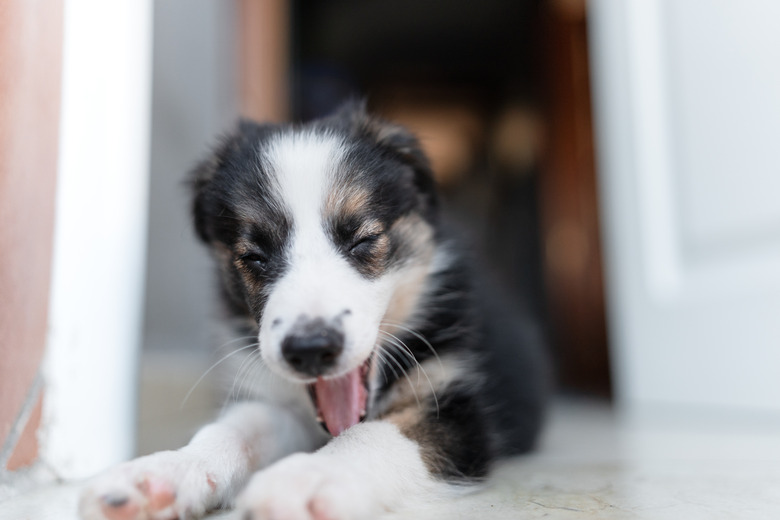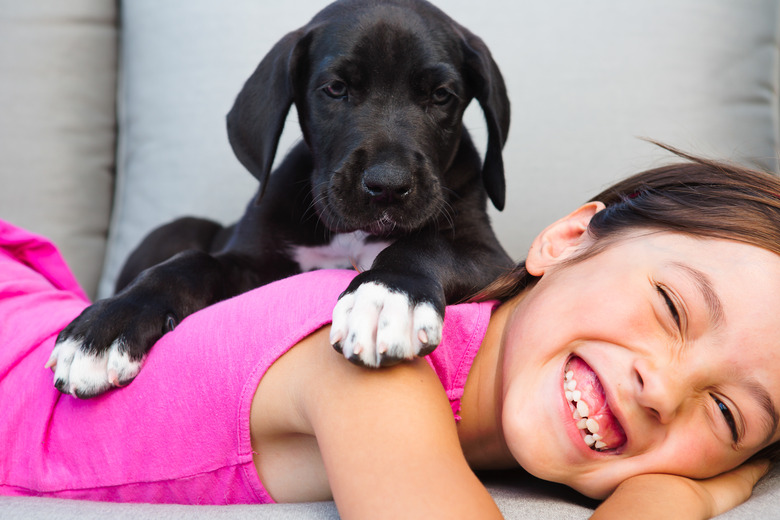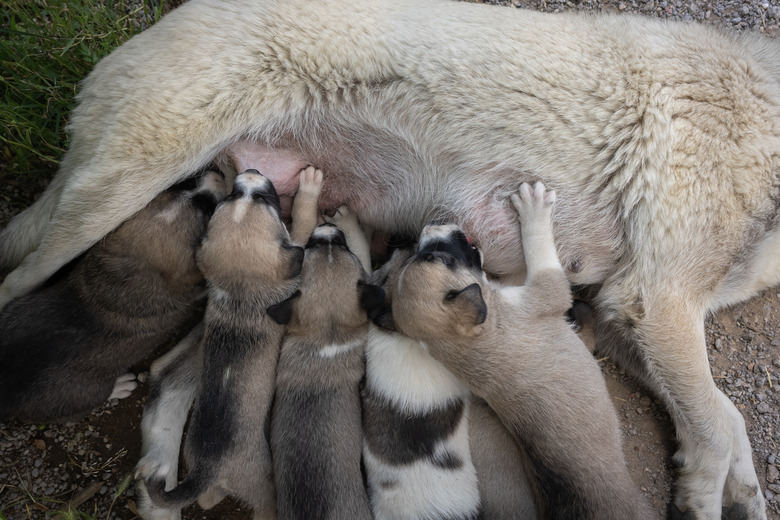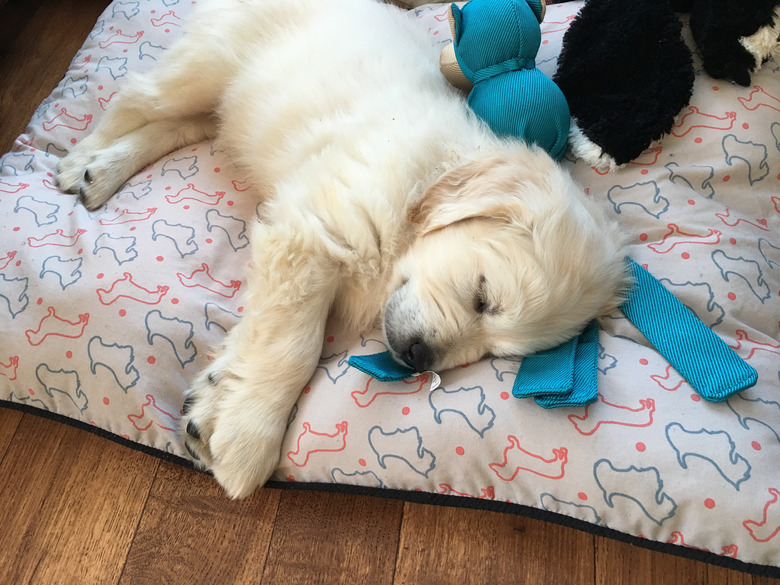When Can You Hold Puppies?
Puppies are adorable and irresistible. They're tiny, cute, and cuddly, and they have that infamous puppy's breath that smells like heaven. However, they are fragile and susceptible to sickness, so you need to practice good newborn puppy care and not be rough when you're holding them.
When can you start holding newborn puppies?
When can you start holding newborn puppies?
You should wait at least 3 weeks before holding newborn puppies, unless it's for a medical examination or they are unable to nurse and need to be bottle fed. Tempting as it is, you should not hold newborn puppies as soon as they come out of the mother's womb. Newborn pups are highly susceptible to hypothermia, meaning they can't regulate their body temperature yet. It's important that newborns spend their time nestled in the warmth of their mother's body heat where they can sleep, nurse, and bond with her and the litter.
They should not be held before they are 3 weeks old unless there's a real need. Newborns don't have a fully developed immune system and are prone to illness, which is another reason to keep human handling to a minimum.
How to hold puppies safely
How to hold puppies safely
Scoop your hand under a puppy's belly and pick them up. Make sure to support the head. Keep the back legs tucked close to the pup's body as you snuggle them close to your body with both hands.
When the puppies are 3 weeks old, you can gently hold them for short amounts of time to start socializing them with people. The primary socialization period is from 3 to 8 weeks of age. Start by softly petting the pups but don't do this while they are nursing or if their mother is cleaning them.
Take signals from the mother dog. If she growls at you when you approach the whelping box or seems agitated or gets aggressive, then stop immediately. If you have other dogs, you'll want to make sure they aren't nearby so the mother doesn't become protective and aggressive.
Supervising children with puppies
Supervising children with puppies
When you handle newborn puppies, you may know to be as gentle as possible. But if there are children who want to hold and cuddle them, you need to caution the children to be gentle. Children should not touch newborn puppies or hold them until weaning begins at around 4 weeks of age. Around this time, the pups slowly become more independent from their mother.
Children should never be allowed to hold or play with puppies without direct adult supervision. Teach children to handle puppies gently because they can be easily injured. Let kids know that since puppies aren't toys, they will express their desires, and they may not want to have human touch or interact with people just because a child wants to hold or play with them.
Newborn puppy care tips
Newborn puppy care tips
Week by week, newborn puppies grow at a rapid rate. They slowly open their eyes, move around more, and gain awareness of their environment. At around 4 weeks of age, they start to eat solid food and wean off nursing. But even with these milestones, they still require extra newborn puppy care.
Make sure the nursing pups eat regularly. If a puppy has difficulty nursing and isn't able to latch onto their mother's teat or if they're not gaining weight as expected, take them to your veterinarian right away to determine if there is an underlying medical condition or illness.
You also need to make sure that the mother is producing enough milk. If she isn't, you need to bottle feed the puppies with puppy milk replacer. You should also talk with your veterinarian to see if the mom needs an exam. If for some reason the mother rejects one or more of her babies, you will need to bottle feed the orphaned puppies as well. Monitor their health and check for signs of sickness, like diarrhea, vomiting, difficulty breathing, discharge from the eyes or nose, poor weight gain, or weakness.
At 3 to 4 weeks of age, start offering the puppies canned or dry puppy food mixed with water or puppy milk replacer. They will start sampling it before they completely wean off their mother's milk and switch to puppy food. You can also buy a scale to keep track of the puppies' weight. Ask your veterinarian what the appropriate weight should be for newborn puppies week by week.
Further care for puppies
Further care for puppies
While the puppies are still in your care, they should receive regular deworming until they are old enough to start a monthly preventative. Soon after the pups are born, talk with your veterinarian about an appropriate deworming schedule.
At 6 to 8 weeks of age, you'll have to take your puppies in for their first vaccinations. Before then, they should be kept away from other dogs in case those dogs are unvaccinated. Until the pups have completed their vaccine series at 16 to 20 weeks of age, they should be kept away from public places where dogs congregate. They should not have contact with sick dogs or any dogs whose vaccine history is unknown.
If your friends or family want to bring their dogs over, make sure that only healthy and fully vaccinated dogs meet the litter. Also make sure that all dogs are closely supervised during these meet and greets.
Even though prospective new owners may be interested in buying a new puppy, allow the litter to stay with their mother until they are 12 weeks old for optimal socialization. If for some reason this is not possible and you have to place the pups in new homes sooner, 8 weeks is the minimum age that a puppy should leave the group.
After your puppies are fully vaccinated, start taking them out in public to socialize them with other people and dogs. This is a critical part of their development and will help them get along with other dogs and people. Take puppies on frequent walks, exposing them to different sights and smells, and consider enrolling them in puppy classes. By socializing early, your pups are more likely to be well adjusted throughout the rest of their life.
The bottom line
The bottom line
The primary period of socialization for young puppies occurs between 3 and 8 weeks of age. That's an important time to start introducing them to people with gentle handling and play. When you first start to hold them, do so slowly and don't take them too far from their mother. Only holding them for one or two minutes is ideal. As time goes on and they become less dependent on their mother, you can hold them for longer.




